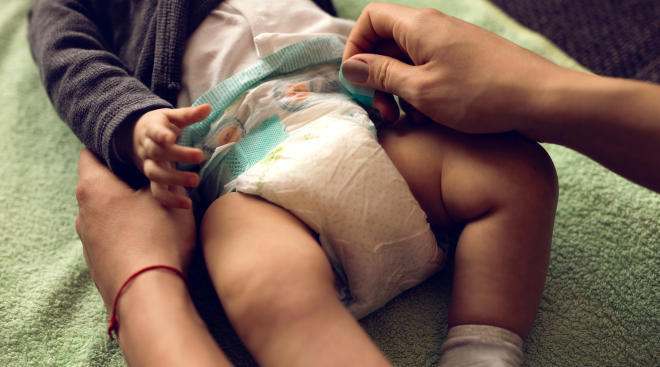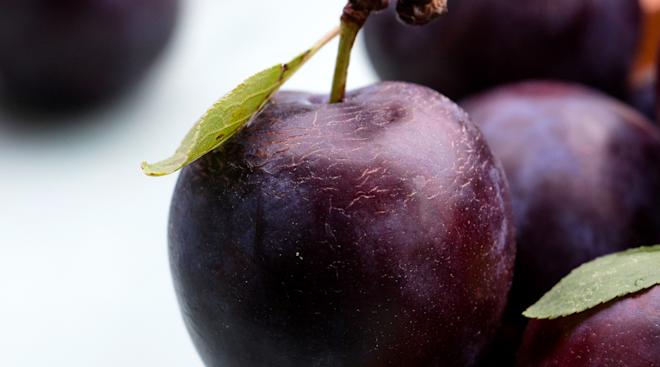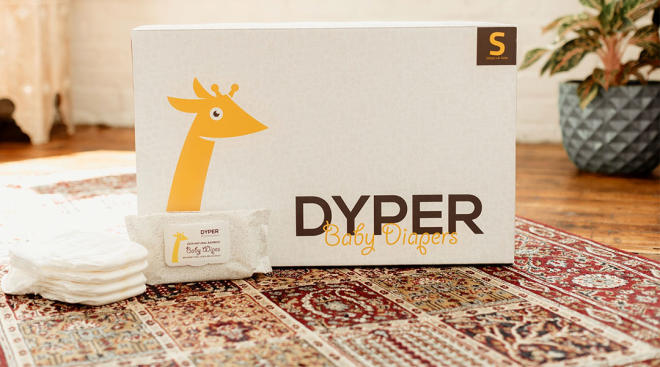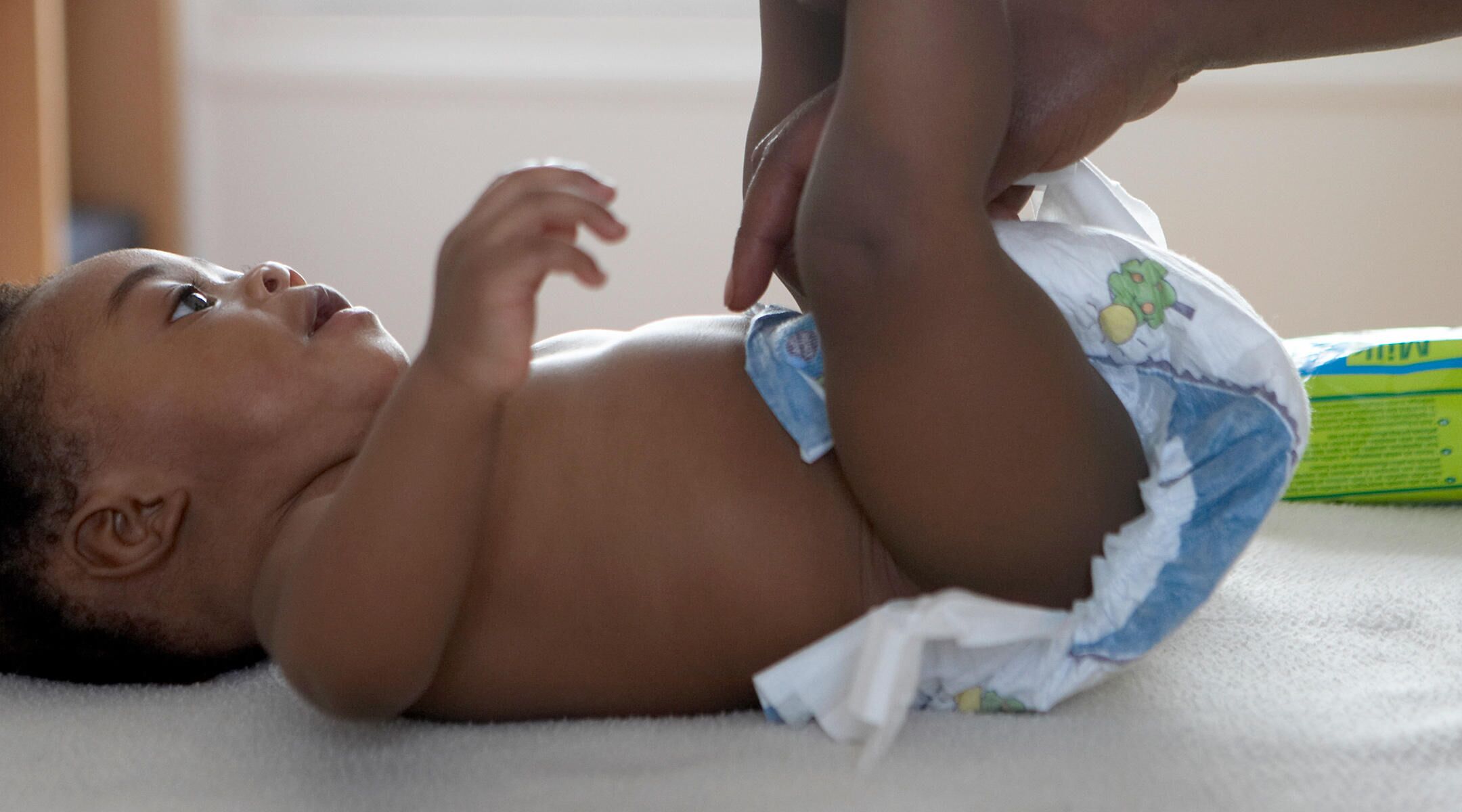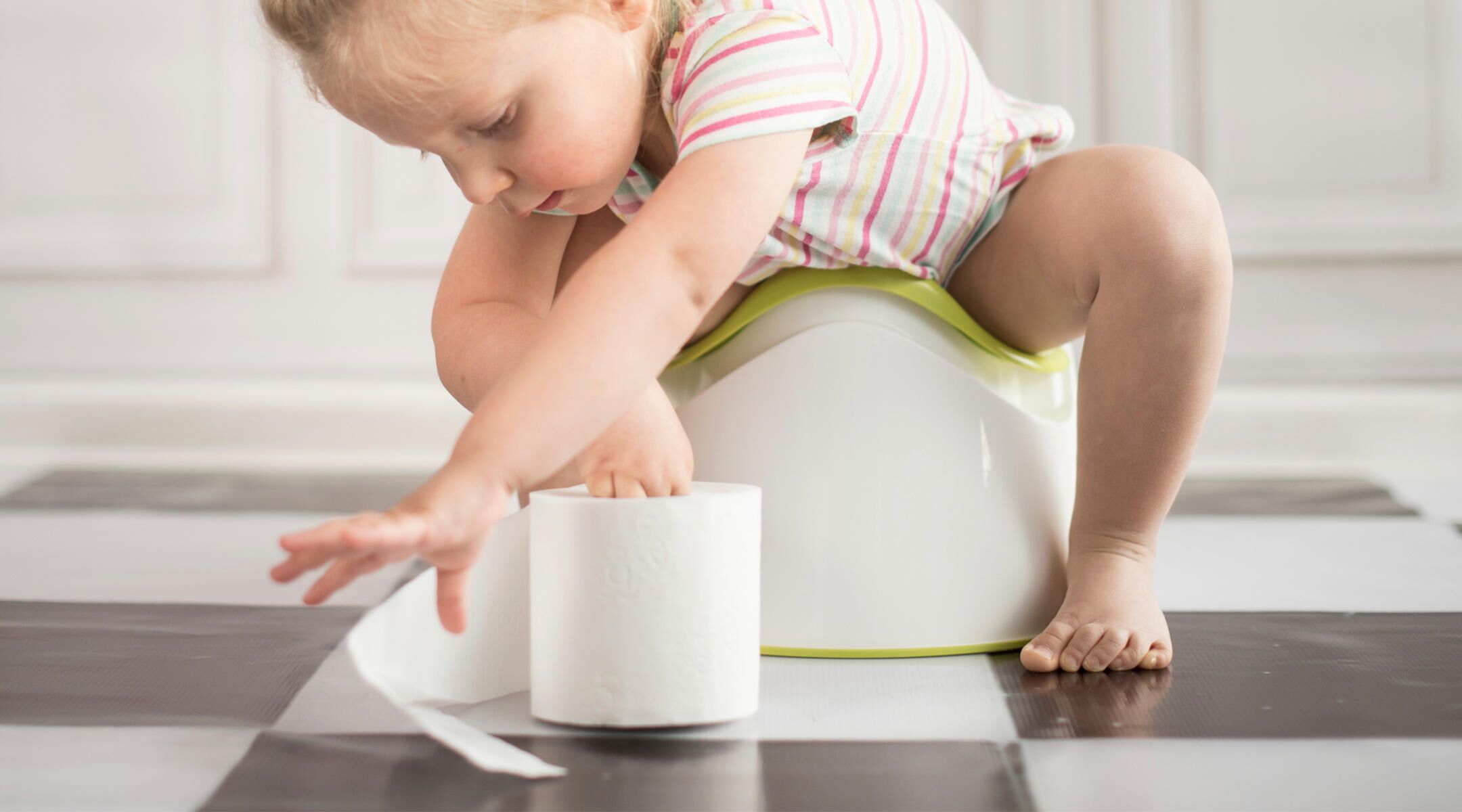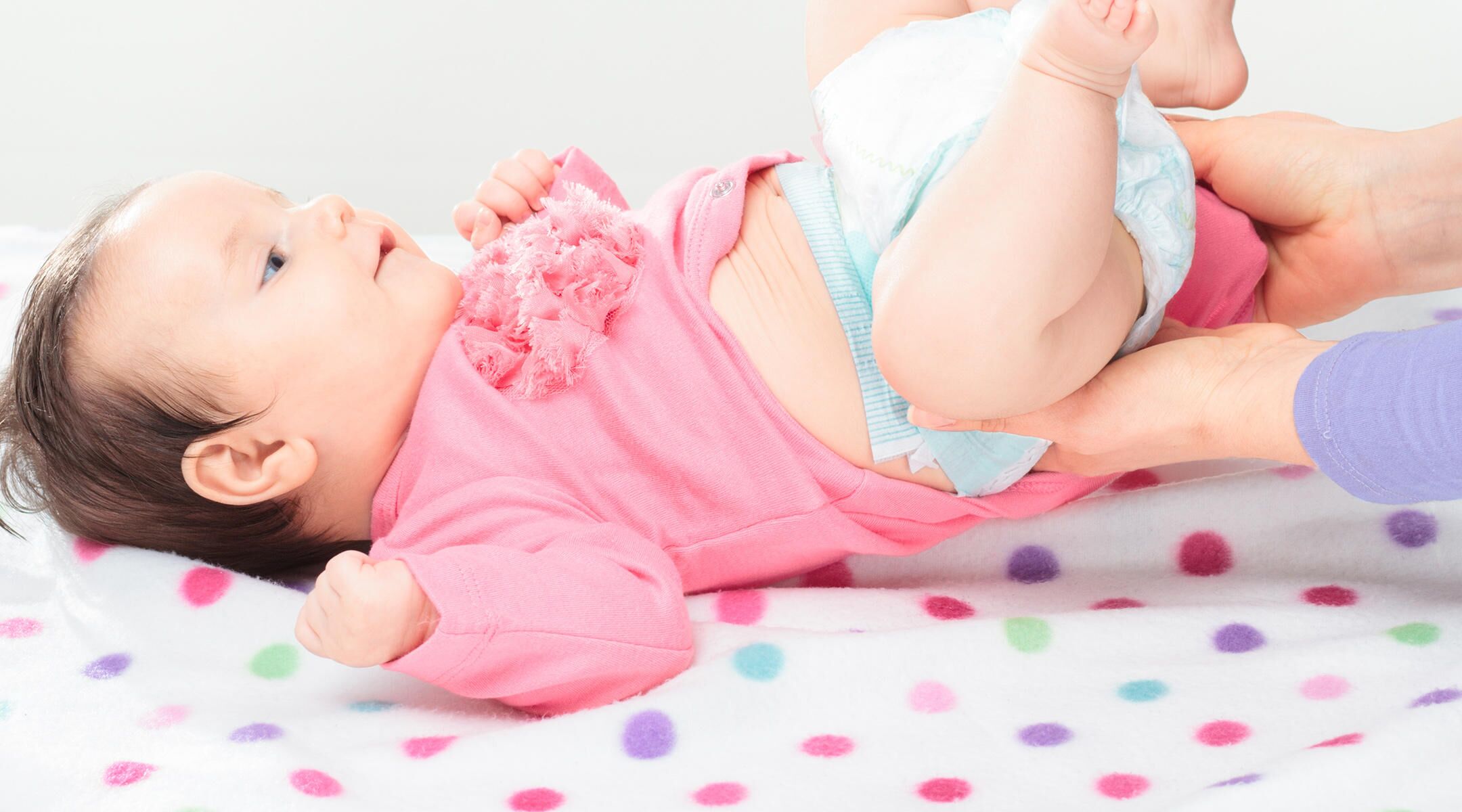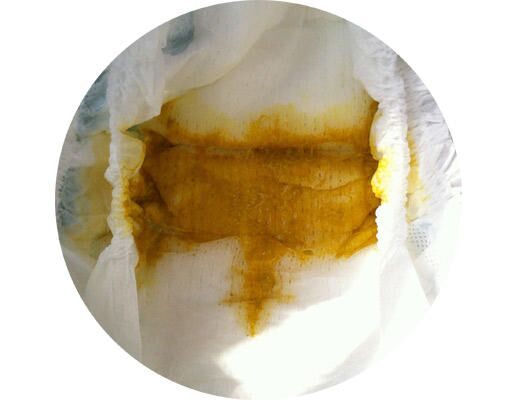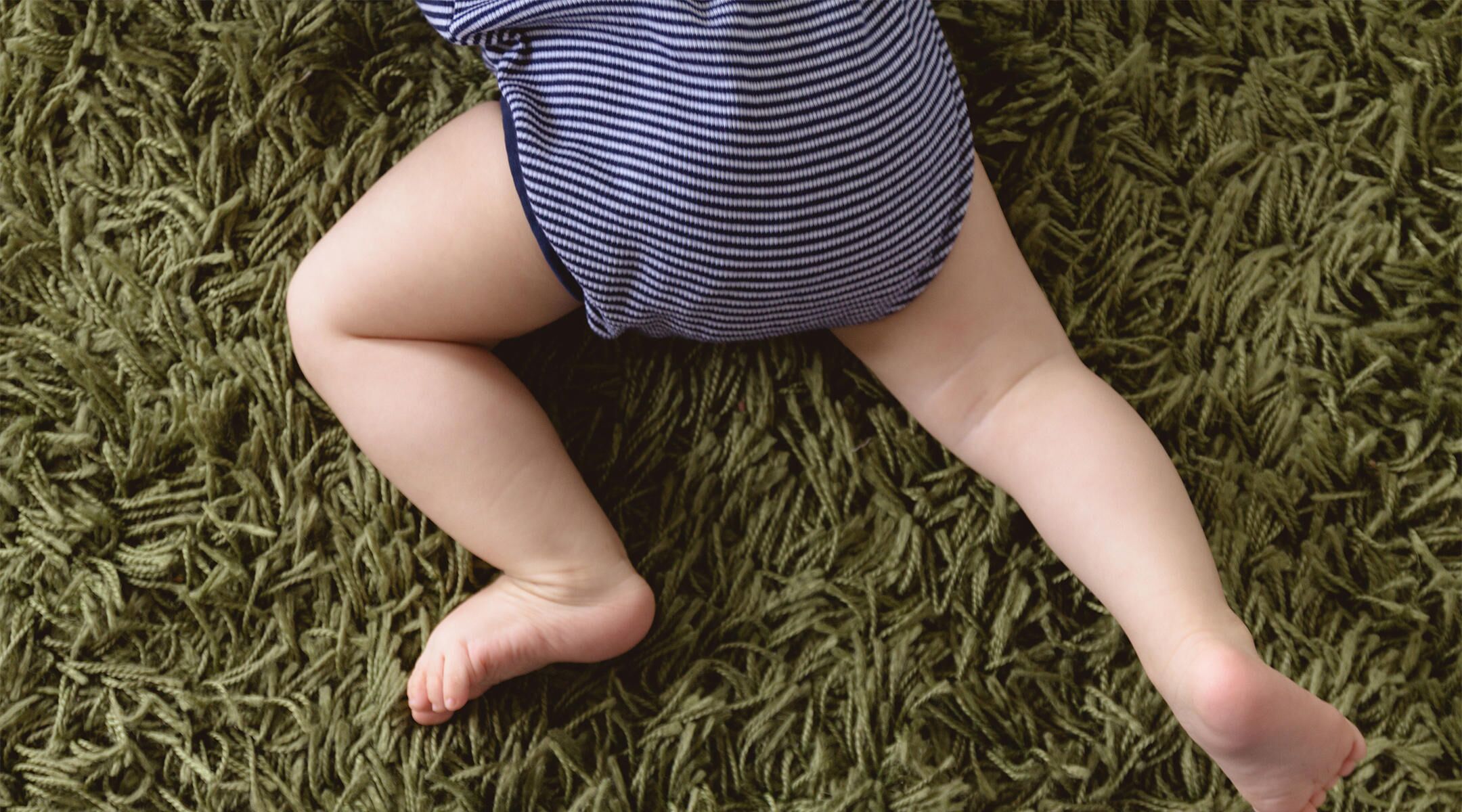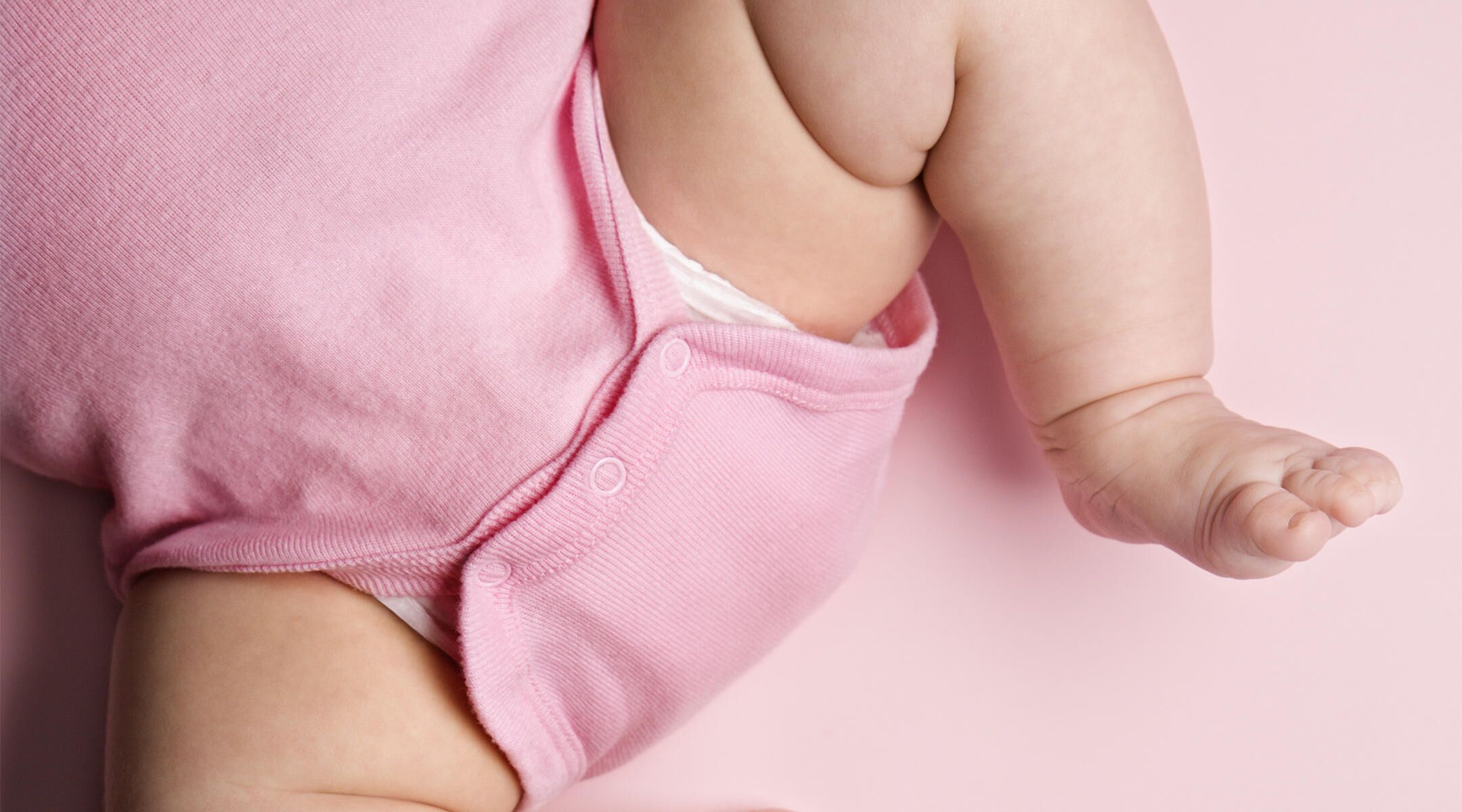How to Identify and Relieve Baby Constipation
Since baby arrived, you’ve probably talked about poop more than you ever imagined. While it might be frustrating to change all those diapers, it’s even more stressful when baby has trouble going or stops altogether. Baby constipation is rough, but sometimes, it’s hard to tell if baby is actually suffering (how little is too little?). Suffice to say, you’ve got poop questions, and we’ve got answers. So is your wee one plugged up, and what does constipated baby poop look like anyway? Here, we’ll give you the lowdown on baby constipation, symptoms to look for, remedies to try and more. You’ll learn what you need to know to get to the bottom of infant constipation and get baby’s belly back on track.
To figure out if your child has a bout of baby constipation, it’s helpful to know how often infants tend to go. For the first three months, a breastfed baby might have anywhere from 5 to 40 bowel movements a week. Since breastfed babies absorb so much of the milk they take in, some can go up to three or four days—or maybe even a week—without pooping. But as long as when they finally do go it’s soft, pain-free and blood-free, it’s all good, says Lisa Santo Domingo, a pediatric nurse practitioner and medical director of Johns Hopkins Hospital’s Pediatric Chronic Constipation Clinic. Their formula-fed counterparts can have anywhere from 5 to 28 BMs a week (or about two a day).
As infants age, breastfed and formula-fed babies start to have about the same number of poops—so from 6 to 12 months, they’ll both experience an average of two poops a day. Keep in mind, these numbers can vary greatly. As long as baby is eating well, gaining weight and seems comfortable, there’s usually nothing to worry about.
There’s a pretty wide range of what’s normal when it comes to how often baby poops. Children up to 4 years of age have to fulfill two or more of the following criteria for at least one month to be diagnosed as constipated, says Santo Domingo:
- Two or less bowel movements per week
- A pattern of painful or hard bowel movements
- History of excessive stool retention
- A large fecal mass felt in the rectum during a physical exam by baby’s doctor
In addition to the symptoms mentioned above, you’ll probably notice a few other signs of baby constipation. Irritability and a decreased appetite, which might disappear shortly after baby passes a large stool, are often telltale clues.
Worried about all that moaning and groaning? Take a deep breath; it’s perfectly normal and isn’t necessarily a sign of constipation in babies. “Grunting and straining to push out a stool is normal in young babies. It’s difficult for them to pass a bowel movement while lying flat on their backs and not getting any benefit from gravity,” says Trina Blythe, MD, a pediatrician at Progress West Hospital in O’Fallon, Missouri.
Babies’ bodies often need time to figure out the whole pooping process, like learning how to relax their pelvic floor to have a bowel movement. “A lot of parents come in and think their child is constipated, when what they’re really dealing with is infant dyschezia—a condition in which an otherwise normal, healthy infant will have at least 10 minutes (though often more) of straining, crying, irritability and maybe turning red or purple in the face while trying to have a bowel movement,” Santo Domingo explains. These symptoms continue until baby finally goes—but the resulting stool is actually soft.
Baby constipation can cause a child to be irritable and fussy, refuse food and push away the bottle. Toddlers who can walk may start going to a corner and squatting or hiding. “The most prevalent cue is when a child starts tip-toeing,” Santo Domingo says. It’s like an instinct they have, feeling that the straighter their body, the better they’ll be able to withhold pooping, which may be painful or scary for constipated children. Even infants who are able to pull themselves to stand will try to straighten out as much as possible when they’re dealing with baby constipation.
What does constipated baby poop look like?
When baby constipation is to blame, baby’s poop comes out in hard balls. “We often use the Bristol Stool Scale, which shows the range of stool textures from one to seven: One is rabbit-like, pellet-shaped poop, and seven is pure liquid,” Santo Domingo says. “We define constipated stool as anything that falls into levels one through three, with three looking like a collection of grapes or corn on the cob.”
Another common sign of constipation in babies is a small amount of blood on the outside of the stool—this can happen when a constipated baby passes stool large enough to create a tiny fissure, which is a small tear in the lining of the anus. If you’re seeing a significant amount of blood, call your child’s doctor right away.
So what causes constipation in babies? Really, it could be due to a number of factors, from foods they’re eating to passing illnesses to family history. Here, we break down the most common reasons behind baby constipation:
- Change in diet. More often than not, a change in diet is the culprit causing baby constipation—whether it’s because you’re shifting from breast milk to formula, transitioning baby to cow’s milk or introducing solid foods. “The introduction of cow’s milk protein—and an allergy or intolerance to it—is probably the largest contributor to baby constipation,” says Santo Domingo. When baby has a cow’s milk protein intolerance (CMPI), their immune system sees the milk protein as something bad it needs to fight off (like it would with harmful bacteria or viruses). This negative reaction to the protein is what leads to a constipated baby with an upset stomach and other intestinal problems. But the good news is that most babies will grow out of it: 50 percent of infants who have CMPI regain tolerance by 12 months, and more than 75 percent will be back on track by age 3.
- Solids. When baby is about 4 to 6 months of age, you can start experimenting with different solid foods. This is when many little ones begin to experience baby constipation for the first time. “For infants who have already started baby foods, giving foods that are high in fiber will help treat and prevent baby constipation,” says Blythe. She recommends feeding them at least two servings of fresh fruits and vegetables daily, and making sure they’re well hydrated.
- Illness. When baby’s not feeling well, they’re probably not eating or drinking as much as usual, which can throw their system out of whack and result in infant constipation.
- Certain medications. High-dose iron supplements or and certain pain medications can lead to baby constipation. Your doctor can let you know if baby’s medicine could be to blame.
- Prematurity. Premature babies tend to have more trouble with infant constipation than full-term babies. Since their digestive systems aren’t fully developed yet, food moves more slowly through the GI tract and isn’t always properly processed, which can lead to dry, hard stools.
- Family history. Certain issues like Hirschsprung’s disease, cystic fibrosis, chronic constipation and celiac disease (which often can’t be diagnosed in children until they’re closer to age 3) can also be a contributing factor.
No parent likes to see their child in discomfort and distress, so knowing how to help a constipated baby can make a world of difference. First and foremost, though, it’s important to realize that constipation in newborns can be a different issue than constipation in older babies. If your baby is not even a month old yet, talk to your pediatrician right away—at this age, constipation could be a sign of an underlying issue, such as Hirschsprung’s disease, a rare congenital condition that happens in about one out of 5,000 births and typically requires surgery. (FYI: This is among the reasons everyone at the hospital is so obsessed with the timing of your newborn passing their first meconium.)
Additionally, if you’re exclusively breastfeeding, it’s important to count those dirty diapers each day because infrequent stooling might actually be a sign of not enough feeding volume, says Blythe.
But if you’ve spoken to your pediatrician and ruled out other issues, there are some baby constipation home remedies and treatments you can turn to. Here are some things you should—and shouldn’t— try to help a constipated baby:
Baby constipation home remedies
For baby constipation relief, you can try giving infants under 6 months with hard bowel movements some water—about one ounce. Heard of giving apple or pear juice for baby constipation? According the American Academy of Pediatrics (AAP), it’s okay to give babies as young as one month a tiny bit of apple or pear juice to treat constipation (one ounce per month of life for babies up to 4 months old.) “The sugars in juice basically bring water into the bowel to help soften the bowel movement,” Santo Domingo says.
You may have been told that using a rectal thermometer can help offer some infant constipation relief, but Santo Domingo doesn’t recommend any kind of rectal stimulation as a remedy. “You always run the risk of perforation, especially given that that area could be irritated,” she says.
She also discourages giving baby mineral oil or Karo syrup for baby constipation. “We’ve found that it doesn’t help. Karo syrup doesn’t soften the stool—it just coats it to make it easier to pass, but you’re still passing a large stool,” says Santo Domingo. Additionally, Karo syrup, like honey, shouldn’t be given to infants under a year of age as it may cause infant botulism. “And with mineral oil, there have been some reports of aspiration,” adds Santo Domingo.
Baby constipation medicine
Wondering what to give a constipated baby? The options are limited. For children who don’t respond to water or juice, you may consider trying a small glycerin suppository to help relieve baby constipation, suggests the Mayo Clinic. It’s important to note, however, that these are meant for occasional use, and shouldn’t be a regular part of baby’s routine.
Some well-meaning friends may recommend gripe water or gas drops. These remedies are generally considered safe, but there’s little evidence these options work to relieve baby constipation. However, many parents say that the former alleviates colic and other tummy troubles and the latter works miracles breaking up gas bubbles. If your doctor gives you the go ahead, there’s no harm in trying either option.
Similarly, probiotics for baby constipation have been increasing in popularity lately, but Blythe remains skeptical. “Probiotics haven’t yet been proven to relieve constipation in infants, so I generally don’t recommend them.” Still, anecdotally, many parents swear by infant-safe tummy and probiotic drops that can help balance bad and good bacteria in the digestive tract. What’s more, while the evidence isn’t concrete, some research indicates that prophylactic use of probiotics can help alleviate some types of digestive troubles in infants. Suffice to say, it doesn’t hurt to try. Of course, before you give baby constipation medication or remedies at home, check in with your pediatrician.
Baby foods that help with constipation
In some cases, your baby’s doctor may want to consider eliminating cow’s milk for a short period of time to see if that’s causing constipation.
For babies eating solids, you can also offer certain baby foods that help with constipation: Try feeding barley or oatmeal cereals, prunes, peaches, plums, apricots and most vegetables. There’s no need to completely eliminate binding foods like bananas and rice, but it’s a good idea to cut back on them if you’re noticing baby constipation symptoms. “Bananas and rice are common binding agents, because they are soluble fibers that soak up water as they pass through your system, and tend to bulk stools,” Santo Domingo says.
Baby massage for constipation
Want to know how to relieve constipation in babies quickly? One of the easiest things you can try is giving baby a massage. Blythe recommends trying a gentle tummy massage of the left side of the belly to help stimulate the colon. And you can do exercises with baby as well. “Bicycling the hips and holding the knees up in a squat position helps simulate the movements needed to have a bowel movement,” Blythe says. You can also try a warm bath for baby constipation. ‘
Baby constipation can be pesky, but it’s typically not cause for concern. Still, if it lasts for two or more weeks or if it’s accompanied by other symptoms, including fever, abdominal swelling or vomiting, reach out to your pediatrician, recommends the Mayo Clinic. If you see blood in your child’s stool, you’ll also want to check in to make sure there are no other issues at play.
As for preventing infant constipation, unfortunately there’s not a lot you can proactively do. “Prevention really comes down to recognizing the warning signs, and trying to stay on top of them,” Santo Domingo says. Of course, monitoring baby’s diet for foods that cause constipation, giving them a diverse assortment of fibrous fruits and veggies and keeping them hydrated may help.
Please note: The Bump and the materials and information it contains are not intended to, and do not constitute, medical or other health advice or diagnosis and should not be used as such. You should always consult with a qualified physician or health professional about your specific circumstances.
Plus, more from The Bump:
Trina Blythe, MD, is a BJC Medical Group pediatrician at Progress West Hospital in O'Fallon, Missouri. She received her medical degree from Albany Medical Center in New York.
Lisa Santo Domingo, DNP, MSN, is a pediatric nurse practitioner and medical director of Johns Hopkins Hospital’s Pediatric Chronic Constipation Clinic. She received her doctor of nursing degree at Johns Hopkins University in Baltimore, Maryland.
Healthy Children, American Academy of Pediatrics (AAP), How Can I Tell If My Baby Is Constipated?, May 2022
Navigate forward to interact with the calendar and select a date. Press the question mark key to get the keyboard shortcuts for changing dates.






































